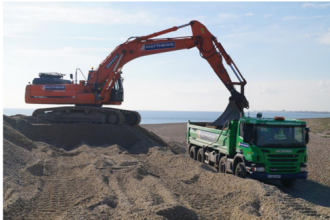Case study:Shoreham Harbour Shingle Bypassing and Recycling: Difference between revisions
(Created page with "{{Case study status |Approval status=Draft }} {{Location |Location=50.8274923, -0.2491000999999642 }} {{Project overview |Project title=Shoreham Harbour Shingle Bypassing and...") |
No edit summary |
||
| Line 6: | Line 6: | ||
}} | }} | ||
{{Project overview | {{Project overview | ||
|Status=In progress | |Status=In progress | ||
|Project web site url=www.therrc.co.uk/sites/default/files/projects/64_shoreham.pdf | |||
|Themes=Flood risk management, Habitat and biodiversity, Social benefits | |Themes=Flood risk management, Habitat and biodiversity, Social benefits | ||
|Country=England | |Country=England | ||
| Line 14: | Line 14: | ||
|Contact organisation=Shoreham Port | |Contact organisation=Shoreham Port | ||
|Contact organisation url=www.shoreham-port.co.uk/ | |Contact organisation url=www.shoreham-port.co.uk/ | ||
|Partner organisations=Environment Agency, | |||
|Multi-site=No | |Multi-site=No | ||
|Project picture=64 Shoreham.png | |||
|Project summary=The harbour arms at the seaward entrance of Shoreham Harbour in West Sussex represent a major obstruction to the natural process of littoral drift along the Sussex coast. Without action, foreshore levels to the east of the harbour would quickly drop to levels that threaten the stability of seawall structures and the build-up of beach material to the west would form a bar across and block the harbour entrance. Shingle bypassing has been carried out every 2 years since 1992. | |||
Littoral drift has caused the accumulation of material west of the harbour entrance with a corresponding lowering of beach levels to the east. Shingle transfer operations (see Map 1) have (mostly) prevented the collapse of coastal structures in areas of depletion. Collapse of these structures would rapidly endanger the ability of Shoreham Port, Shoreham Power Station and Shoreham Wastewater Treatment Works to function. A collapse would also threaten the A259 and residential properties behind it. | |||
|Project title=Shoreham Harbour Shingle Bypassing and Recycling | |||
}} | }} | ||
{{Image gallery}} | {{Image gallery}} | ||
Revision as of 16:18, 8 November 2018
This case study is pending approval by a RiverWiki administrator.
Project overview
| Status | In progress |
|---|---|
| Project web site | http://www.therrc.co.uk/sites/default/files/projects/64_shoreham.pdf |
| Themes | Flood risk management, Habitat and biodiversity, Social benefits |
| Country | England |
| Main contact forename | Tony |
| Main contact surname | Parker |
| Main contact user ID | |
| Contact organisation | Shoreham Port |
| Contact organisation web site | http://www.shoreham-port.co.uk/ |
| Partner organisations | Environment Agency |
| Parent multi-site project | |
| This is a parent project encompassing the following projects |
No |
Project summary
The harbour arms at the seaward entrance of Shoreham Harbour in West Sussex represent a major obstruction to the natural process of littoral drift along the Sussex coast. Without action, foreshore levels to the east of the harbour would quickly drop to levels that threaten the stability of seawall structures and the build-up of beach material to the west would form a bar across and block the harbour entrance. Shingle bypassing has been carried out every 2 years since 1992.
Littoral drift has caused the accumulation of material west of the harbour entrance with a corresponding lowering of beach levels to the east. Shingle transfer operations (see Map 1) have (mostly) prevented the collapse of coastal structures in areas of depletion. Collapse of these structures would rapidly endanger the ability of Shoreham Port, Shoreham Power Station and Shoreham Wastewater Treatment Works to function. A collapse would also threaten the A259 and residential properties behind it.
Monitoring surveys and results
Lessons learnt
Image gallery
|
Catchment and subcatchment
Site
Project background
Cost for project phases
Reasons for river restoration
Measures
MonitoringHydromorphological quality elements
Biological quality elements
Physico-chemical quality elements
Any other monitoring, e.g. social, economic
Monitoring documents
Additional documents and videos
Additional links and references
Supplementary InformationEdit Supplementary Information
| ||||||||||||||||||||||||||||||||||||||||||||||||||||||||||||||||||||||||||||||||||||||||||||||||||||||||||||||||||||||||||||||||||||||||||||||||||||||||||||||||||||||||||||||||||

